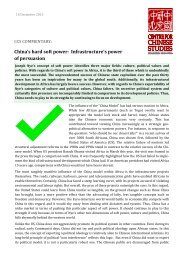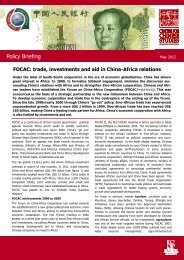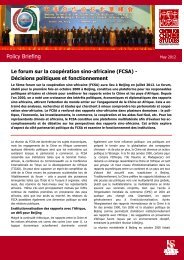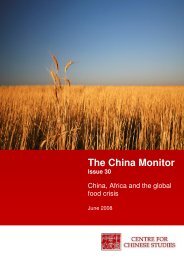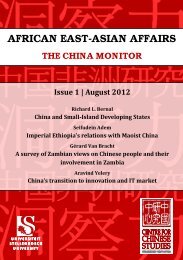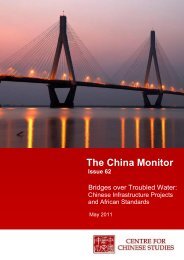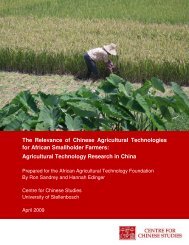The China Monitor - The Centre for Chinese Studies
The China Monitor - The Centre for Chinese Studies
The China Monitor - The Centre for Chinese Studies
Create successful ePaper yourself
Turn your PDF publications into a flip-book with our unique Google optimized e-Paper software.
<strong>The</strong> <strong>China</strong> <strong>Monitor</strong><br />
April 2011<br />
such as crude oil, iron, cotton, and diamonds; African imports from <strong>China</strong> include<br />
electrical appliances, textiles, machinery, and chemicals, among others 3 . It was also<br />
after the Re<strong>for</strong>m that <strong>China</strong> embraced a more liberal economy and its manufacturing<br />
industry became increasingly privatized and deregulated. Guangzhou became<br />
known as the “world's factory” as the private manufacturers flourished in southern<br />
<strong>China</strong>, where cheap goods are produced en masse with low labour cost. Around the<br />
same time, market demand in the populous regions of West Africa underwent a<br />
rapid expansion. For instance, the Nigerian markets rely heavily on imports, earning<br />
Nigeria a reputation as the “cargo economy”, and it is described that “ships laden<br />
with containers dock at Nigeria‟s ports and return almost empty to their places of<br />
origin, as Nigeria does not have much to export” 4 . <strong>The</strong> local market has been<br />
dependent on <strong>for</strong>eign imported goods, especially from <strong>China</strong> in the last few decades.<br />
In the 1980s and the 1990s, large numbers of African merchants were seen in the<br />
Canton Fair in Guangzhou. <strong>The</strong> Canton Fair is the largest international trade fair in<br />
<strong>China</strong> which happens twice every year since 1957. It is a main expo event where<br />
<strong>Chinese</strong>-made goods are displayed and ordered <strong>for</strong> export to different corners of the<br />
world. <strong>The</strong> African markets found their “gold mine” in the east here and their needs<br />
could be met by inexpensive means. In the late 1990s, many more individual African<br />
dealers travelled from Sub-Saharan countries to Guangzhou to order goods other<br />
than fair seasons. <strong>The</strong>se petty traders are different from the Canton Fair traders in<br />
several aspects:<br />
1. they do not own or represent <strong>for</strong> any firm back in their countries 5 , nor do<br />
they have considerable funds <strong>for</strong> placing substantial orders;<br />
2. instead of attending the Canton Fair held in officially built expo halls, the<br />
petty traders gather around the old railway station where shops are sub-let<br />
to <strong>Chinese</strong> and African migrants, who are often selling fake goods and<br />
participate in semi-legal activities;<br />
3. instead of getting official invitation letter to stay in <strong>China</strong> <strong>for</strong> three months,<br />
the traders find their way to “buy” invitation letters 6 from <strong>Chinese</strong> whom they<br />
do not even know and, if they need to, overstay their appointed stay period<br />
to continue business;<br />
4. instead of staying in nice starred hotels, these traders find almost free<br />
accommodation through network or they stay at special discounted rooms in<br />
cheap hostels;<br />
5. instead of having guarantees such as institutional organisation and<br />
certificate that their goods are in good condition, the traders may have<br />
nothing more than a spoken promise or a hand-written receipt that is kept<br />
off-book.<br />
“<strong>The</strong> traders near the railway<br />
station and Canton Fair<br />
traders are at two opposite<br />
ends, as semi-legality versus<br />
legality, in<strong>for</strong>mal economy<br />
versus <strong>for</strong>mal economy.”<br />
<strong>The</strong> traders near the railway station and Canton Fair traders are at two opposite<br />
ends, as semi-legality versus legality, in<strong>for</strong>mal economy versus <strong>for</strong>mal economy,<br />
globalisation from below versus globalisation from above. It is a “globalisation from<br />
below” where the lower strata of the society attempts to participate and benefit from<br />
the world economy 7 . By all means, the African traders as well as the local business<br />
partners in Guangzhou are a mobilizing <strong>for</strong>ce that is not only self-interested but also<br />
symbolically grassroot globalization.<br />
<strong>The</strong> most frequently traded clothes (Polo shirt and T-shirt) in the African market in<br />
Guangzhou are made of cotton. <strong>The</strong> cotton agriculture is mainly located in the<br />
northern <strong>Chinese</strong> provinces, such as Hebei, Henan, Shanxi, Shandong, Hubei,<br />
Xinjiang and so on. <strong>The</strong> cotton farmers pick the ripe cotton and sell it to the textile<br />
factories, which process the raw material. <strong>The</strong>y developed the cotton into cotton<br />
© <strong>Centre</strong> <strong>for</strong> <strong>Chinese</strong> <strong>Studies</strong>, Stellenbosch University; All Rights Reserved<br />
5



